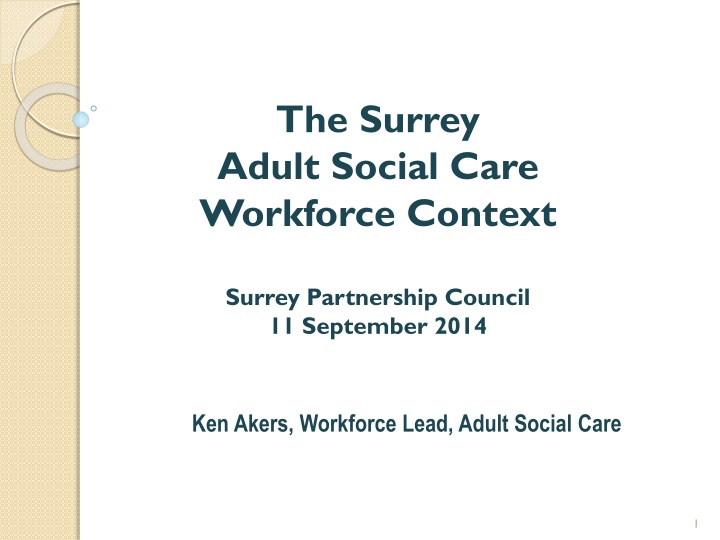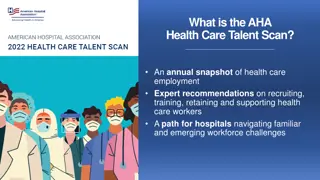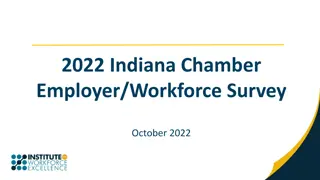Future Trends in Adult Social Care Workforce in Surrey
Discussing the future outlook for adult social care workforce in Surrey, focusing on key themes such as workforce enablement, new employee groups, preventative approaches, integration, and supporting diverse demographics up to 2035. Insights include workforce capacity, training standards, funding models, and addressing complex care needs.
Download Presentation

Please find below an Image/Link to download the presentation.
The content on the website is provided AS IS for your information and personal use only. It may not be sold, licensed, or shared on other websites without obtaining consent from the author.If you encounter any issues during the download, it is possible that the publisher has removed the file from their server.
You are allowed to download the files provided on this website for personal or commercial use, subject to the condition that they are used lawfully. All files are the property of their respective owners.
The content on the website is provided AS IS for your information and personal use only. It may not be sold, licensed, or shared on other websites without obtaining consent from the author.
E N D
Presentation Transcript
The Surrey Adult Social Care Workforce Context Surrey Partnership Council 11 September 2014 Ken Akers, Workforce Lead, Adult Social Care 1
What is the future for adult social care? Workforce as enablers; new workforce groups Direct payment recipients as employers Personalisation Locality focus Joined-up workforce commissioning Integration Workforce focussed on prevention and independence Care Bill Quality Workforce culture of dignity and respect Social capital Able to draw on and develop community skills Welfare benefit reform Workforce able to provide advice and information Support disabled people into work 2
What is the future for adult social care? National Minimum Training Standards and Code of Conduct Raising Standards, Putting People First Social Work Reform Board Professional responsibility Workforce has capacity to support a greater number of assessments Workforce able to support or signpost residents with financial planning Funding reform Alternative operating models Employee-run businesses Workforce supports carers within a whole family approach Support workers who are carers Carers Workforce able to support residents with complex and challenging behaviours Dementia 3
Surrey demographics: 2013 to 2035 Source: POPPI, PANSI and ONS Older People Adults with Physical or Sensory Disabilities (18- 64) Adults with Learning Disabilities 350000 80000 26000 330000 24000 310000 78000 290000 22000 76000 270000 20000 250000 74000 18000 230000 16000 72000 210000 14000 190000 70000 12000 170000 10000 150000 68000 2013 2020 2035 2013 2020 2035 2013 2020 2035 Age 65+ Age 18-64 Age 85+ Age 65-84 These graphs show the % increase in the different adult groups between 2013 and 2035. The most significant increases are: People aged 65+: increase of 55% from 2013 to 2035 (People aged 85+ 128% increase) Older People with a Learning Disability: increase of 55% from 2013 to 2035 4
The Surrey adult social care workforce now Out of an economically active population of 600,400 in Surrey, 10.6% of workers are employed in the human health and social work sector Skills for Care estimate there were approximately 33,900 jobs in the adult social care sector in Surrey in 2010, employing around 29,400 people Who employs the adult social care workforce in Surrey? Source: Skills for Care 21% Private and voluntary sector employers Local authority employer Direct payment employers 15% 64% 5
The Surrey adult social care workforce now What is the make-up by job role of the adult social care workforce in Surrey? 3% 8% 19% Manager Social Worker 4% Care Worker and Senior Care Worker 4% Community, Support and Outreach Work Registered Nurse Non care-providing staff 62% Source: NMDS The majority of frontline adult social care staff (66%) are in non professionally qualified roles 6
Demand: Projected growth in number of adult social care jobs in Surrey (2010-2025) 65,000 Source: Skills for Care 60,000 Number of adult social care jobs 55,000 50,000 45,000 40,000 35,000 30,000 2010 33,900 33,900 33,900 33,900 2015 36,612 38,081 41,245 43,166 2020 39,324 42,262 48,590 52,432 2025 42,036 46,443 55,935 61,698 "Restricted Resources" (24% growth) "Contain and Community" (37% growth) "Base Case" (65% growth) "Maximising Choice" (82% growth) Between 8,135 and 27,798 extra adult social care jobs will be needed in Surrey by 2025, depending on the model used 7
Demand: Estimated number of adult social care workers which would need to be recruited/annum (2010-2025) 14,000 Source: Skills for Care and NMDS 13,000 Number of adult social care workers needed to recruit 12,000 11,000 annually 10,000 9,000 8,000 7,000 6,000 5,000 4,000 2010 7,017 7,017 7,017 7,017 7,017 2015 8,935 8,538 7,883 7,579 7,017 2020 10,853 10,058 8,748 8,140 7,017 2025 12,771 11,579 9,614 8,701 7,017 "Maximising Choice" (82% growth) "Base Case" (65% growth) "Contain and Community" (37% growth) "Restricted Resources" (24% growth) Turnover only (0% growth) Current average turnover across the adult social care sector is 20.7% Depending on the model used, by 2025 up to 12,771 jobs will need to be recruited every year to ensure all jobs are filled (assuming turnover does not change) 8
Supply: Proportion of the Surrey population who are economically active (2010-2035) 2035 2025 Year 2015 2010 0 200,000 400,000 600,000 800,000 1,000,000 1,200,000 1,400,000 2010 245700 688300 190800 2015 257500 696900 217400 2025 279500 722600 259000 2035 274900 740200 322400 0-17 18-64 65+ Size of Surrey population by age Source: ONS Although Surrey s population is projected to grow by 19.5% by 2033, over half of this increase is accounted for by people of pensionable age (i.e. 65 years old and over) The ratio of adult social care jobs to economically active population almost doubles between 2010 and 2025 (assuming maximising choice scenario) 9
Supply: Surrey economy Unemployment Source: NMDS and ONS Surrey Region England % JSA claimants 3.77 % of JSA claimants aged 24 and under 21.3% of JSA claimants who have been claiming for over 6 months 21.3 South East Surrey 2.50 1.60 35.2 Pay Region Gross hourly pay across whole workforce (full time) 14.24 15.44 18.07 Gross hourly pay of care worker (full time) 6.72 7.03 7.35 Living wage (hourly) England South East Surrey 7.45 8.55 (London) - Compared to other regions, Surrey has a relatively small unemployed population. A significant percentage of these are aged 24 and under. Compared to other regions, gross hourly pay in Surrey is relatively high. It is almost x2.5 times the gross hourly pay for care workers. 10
Supply: Distance to work Surrey adult social care workforce: distance to work office from home Percentage Less than 1 mile 20.1% 9.9% 1-2 miles 2-3 miles 3-4 miles 4-6 miles 6-10 miles 10-15 miles 15-25 miles Source: NMDS All Residential All Non-Residential 17.1% 11.6% 12.4% 11.6% 9.1% 9.7% 15.4% 17.7% 15.3% 21.3% 7.5% 11.6% 3.0% 6.6% Almost 75% of the residential care workforce live within 6 miles of their work base. 60% of the non-residential care workforce live within 6 miles of their work base. 11
Developing social care workforce strategy DEVELOPING, MONITORING AND REVIEWING Health Education Kent, Surrey and Sussex Clinical ccommissioning groups District and borough authorities Acute, community and other health providers Surrey Independent Living Council Surrey County Council Surrey Care Association Surrey Community Action Skills for Care Action for Carers Health and Wellbeing Board ENABLING AND SETTING DIRECTION Surrey residents ENGAGING AND CONSULTING Skills for Care Regional Network Better Care Fund Board Workforce Board Engagement forums Public Sector Transformation Network Commissioners Reference Group Health Education Partnership Board Surrey County Council Member Reference Group Workforce organisations, service providers and community organisations Partnership boards and joint projects Partner organisations leadership teams DELIVERING AND IMPLEMENTING 12
Workforce development initiatives Theme Potential projects/initiatives Potential partners Image and supply Develop a pre-employment programme in Surrey through Education Business Partnerships and SCC links to schools and careers advisory services, to include both a health and adult social care focus (including graduate element) JCB, CSF, FE Colleges, HEKSS , EBC, SCA To develop a rotational apprenticeship pilot across health and social care in Surrey, potentially using the National Skills Academy for Health job vacancies at the end for apprentices (includes mapping and joining up apprenticeship frameworks) Health Education Kent Surrey Sussex (HEKSS), SfC, SfH, LEPs, SCA, Public Service Transformation Develop a joint apprenticeship hub providing coordination and support for adults social care apprentices SCA, JCP, FE colleges, CSF, SfC, LEPs Work with Further Education colleges to improve understanding and promotion of health and social care careers, opportunities and apprenticeships SCC, SfC, FE colleges, Investigate possibility of a joint bid to both LEPs in conjunction with SCC, NHS, SfH and SfC to access EU funding, on a matched funding basis, around a HUB or employer model with a focus on community support workers/domiciliary care HEKSS, SfC, SfH, SCA, Public Service Transformation 13
Workforce development initiatives Theme Potential projects/initiatives Potential partners Image and supply Developing regional approach to workforce planning and commissioning sharing data and supply information HEKSS, LAs, SfH, SfC Continue development of the Target Operating Model and financial modelling to better understand workforce supply challenges Health and social care commissioners Review workforce elements of SCC commissioning specifications to promoted good employment practice and the Social Care Commitment SCC Improve education commissioning information for social care professionally qualified staff SCC, SfC, higher education sector Work with the Domiciliary Care Sector to address develop a recruitment and retention action plan SCC, providers Work with providers and SfC to implement the SfC recruitment and retention strategy in Surrey SCC, SfC Work with elected members to support their role as champions for the social care sector SCC, SfC Work with Skills for Care to improve the take up social care accolades to help improve the image of social care with the media and public SCC, SfC Continue to develop and improve NMDS take-up and access to the WDF to support training and development SCC, Surrey and South East WDF 14
Workforce development initiatives Theme Potential projects/initiatives Partners Career pathways/skill development Look at developing common career pathways across adults social care and health SCC, SfH, HEKSS, SfC Investigate possibility of developing a skills passport across adults social care and health including core training standards Skills for Health, HEKSS, Public Service Transformation, LEPs Implement Surrey Skills Academy for multi-agency training and to support new training initiatives SCC, SCA, H&SC JTP Developing a new approach to systems leadership between public, private and voluntary sector SfH, NHS Leadership Academy, SABT, SfC, SCC Supporting links with care homes in respect of training and with a focus on dementia extending the Dementia Friendly Surrey project SCC, Dementia Consortium, HEKSS Increasing take up and promotion of joint training through work with care home forums and closer working with health partners SCC, SABPT, HEKSS Review training support for Personal Assistants making sure there is access to workforce development support SCC, SILC 15
Workforce development initiatives Theme Potential projects/initiatives Partners Care pathways/skill development Review social care commissioning specification to include career and skills development SCC, SCA Work with SfH&C and HEKSS on development and promoting of the new Fundamental Certificate in Care and Health SCC, SfH, SfC, HEKSS Work with commissioners in health and care to support integration of services to support community based care and health services through the Better Care Fund SCC, CCGs, local health economies Work with the independent, voluntary and health sector to understand, define and support new workforce and skills development to support the Care Bill (including rapid response and integrated services) SCC, providers and voluntary sector Work with HEKSS to review on-going education commissioning frameworks for health and social care to facilitate joint health and social care education models HEKSS, SCC, SfC, SfH Supporting implementation of statutory safeguarding board with ongoing improvement to skills development and training offer Safeguarding Board, SCC Continue to promote carers training needs 16
Workforce development initiatives Theme Potential projects/initiatives Partners Volunteering Extending and increasing support to develop volunteers services in District and Boroughs as part of Friends, Families, Communities Project (Surrey County Council) and Dementia Friendly Surrey SCC, Ds&Bs, voluntary organisations Supporting development of community skills programmes to support community volunteers working in social care provision as part of community asset mapping Voluntary organisations, SCC 17
Consultation and implementation process ACTION UPDATE Document and feedback form to key stakeholders September and October Action planning priorities November Review and monitoring arrangements in place December 18























